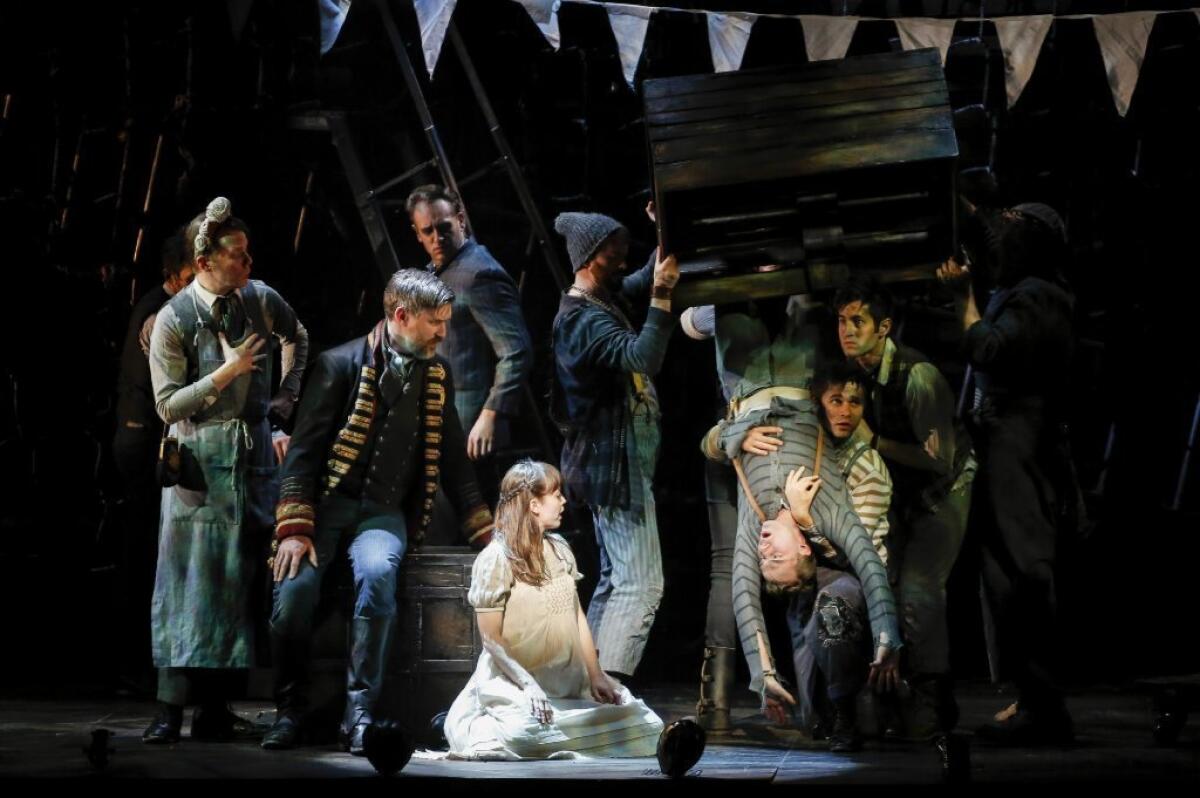Another reason live theater is dying: Stupid theater managements

We keep hearing that live theater is in a bad way. There’s scarcely a drama company around that doesn’t depend on government assistance or philanthropic donations; mounds of financial appeals from worthy performance groups come to me weekly by mailbox and phone.
So you wouldn’t think a theater management would go out of its way to give would-be playgoers another reason to stay home. Yet that’s what I encountered on Saturday night. The occasion was a performance of the play “Peter and the Starcatcher.” The place was the Ahmanson Theatre, at the Music Center in downtown Los Angeles.
As showtime approached, the PA system came on with the usual request that the audience refrain from recording, photographing, texting or chitchatting on their phones, and that they unwrap their hard candies NOW. Then the lights came down ... and the mezzanine, where I was sitting, filled with the sound of a baby yowling.
Yes, that’s right. The Ahmanson on a Saturday night admitted a patron with an infant who proceeded to gurgle, coo, and squeal inside the hall, ruining half the show for hundreds of paying playgoers. Until intermission, when the complaints rolled in, the management did nothing.
Everyone knows that audience rudeness and management indifference have permanently wrecked the movie-going experience. But there’s been reason to hope that live theater still might a haven of civility, where people go to lose themselves in a performance, in shared appreciation with their fellow audience members.
It’s a false hope. The habits of inattention, self-indulgence, and unconcern for the very presence of others that have come from years of TV viewing at home have infected almost every public space. Movie ushers don’t relish policing this behavior, any more than airline flight attendants or pilots look forward to quelling an insensitive passenger. Now, it seems, managers at legitimate theaters won’t even enforce their own house rules.
The unfortunate truth is that ephemeral as Saturday night’s disturbance may be, it’s far from unique in theaters.
Last spring, National Review writer Kevin D. Williamson uncorked a vigorous debate about public civility and incivility by reporting his remedy for a fellow theater-goer’s use of her cellphone during a performance: He grabbed the device from her hands and flung it across the hall. The percentage of articles in the National Review with which I agree can be conservatively estimated at zero, but I confess that (on the inside) I was with Williamson on this.
The most famous response to audience rudeness belongs to the great Patti LuPone, who halted a 2009 performance of “Gypsy” in mid-number to berate a patron from the stage for taking pictures. She refused to continue the performance until the offending party was evicted. Her tirade -- presumably recorded by someone else violating the rules of audience behavior -- can be heard in its glorious entirety here.
Normally I prefer to avoid using this space to grouse about the multifarious indignities that befall me, and everyone, in daily life; otherwise I could post 30 times a day and there’d be no space left for any other topic. The privilege of using a blog to strike back at bad customer service I reserve for occasions when the offense is more general. The last time was in March 2012, when the Los Angeles Angels forced my wife to spend nine hours over two days redeeming ticket vouchers we’d received as a gift; but she was one of thousands of fans who had been similarly mistreated -- there were so many that the affair made it onto TV and into the local press.
Saturday’s incident was in the same category. After Act One, hundreds of eyes were scanning the rear of the mezzanine looking for the offender, and the disturbance was the topic of general conversation in the seats. I know I wasn’t the only person to complain personally, because when I asked a house employee to summon the theater manager during intermission, the first words out of her mouth were: “Is this about the baby?”
The manager told me the Ahmanson indeed has a written policy against the admission of infants. She explained that she had made an executive decision to waive it this time because the patron had paid for four tickets at $89 each, including one for the baby and two for her older children, and there were rows of empty seats in the back of the mezzanine where she figured the family would be tolerably remote from other playgoers and presumably nondistracting. Plus, the mother promised to take the baby out of the hall if it got noisy.
Leaving aside the question of what would possess a mother to pay $89 to carry an infant into a theater for an adult performance, totally heedless to the impact her indifference might have on other playgoers, the management’s rationale struck me as surpassingly misguided. First, the very principle that allows actors onstage to be heard by customers in the last row of the upper balcony is that in a theater sound carries. Second, here’s the Ahmanson’s age policy, complete:
“Children under age 6 are not admitted at any performance unless the production specifically appeals to very young children. Infants and young children that are crying or fidgeting during performances not appropriate for them can be extremely disruptive to everyone in the theatre. There are no exceptions.”
“Peter and the Starcatcher” isn’t exactly Albee or O’Neill, but a pastiche on Peter Pan; still, as the program itself makes clear, it’s not designed as a children’s show. In any case, the obvious flaw in a no-exception policy is that it doesn’t work if you make exceptions.
It’s cold comfort that the ticket holder pledged to leave if her baby made noise, because she didn’t. Nor did the theater monitor her compliance, preferring not to act until the complaints rolled in. After intermission, the manager offered to move mother and baby to a separate room where the performance could be viewed on closed-circuit TV, but for the rest of us the damage was done.
I can hear some of you saying, “What’s the big deal? Aren’t there more important issues to get ragged about than an hour’s inconvenience to a bunch of rich theatergoers -- the struggle to bring affordable healthcare to millions of Americans and the rising tide of income inequality, for instance?”
Sorry, that won’t do. The struggle to achieve a civilized existence in the modern world presents issues large and small, and there are no grounds to rule any of them out of order. Theater prices have long since reached the level of a very occasional luxury for many families, if that; for “Peter and the Starcatcher” they ranged from $35 to $110, and not for everyone is this pocket change.
Part of that premium price covers a commitment by management to provide a reasonably distraction-free environment for enjoyment of the show. To do any less not only breaks a compact with the customer, but shows uncommon disrespect to the production’s creative talent. The reason we still go to live theater is that it offers, without the artifice of computer-generated imagery or other high-tech fakery, a magical simulacrum of real life unique in performance art. The personnel of “Peter and the Starcatcher” worked very hard to achieve this, but that fragile magic can be destroyed in the blink of an eye or the momentary bleat of a baby.
Unlike the Williamson and LuPone incidents, in this case the Ahmanson management was a willing participant in the ruining of a night out for its patrons. There’s no good outcome for the theater, or The Theater, if this trend continues.
When I wrote about that Angels ticketing fiasco, I warned that the team’s indifference to its fans’ happiness could come back to bite it if, say, its big star Albert Pujols turned in a couple of disappointing seasons or the team failed to excel. And that’s what happened -- the Angels have played sub-.500 ball over the last two years and ticket sales are down. The Ahmanson -- and theater managements everywhere -- should pay heed. If people want to be assaulted by all the noise and indignity of life outside the theater and concert hall, they’ll just stay home. It will certainly be cheaper.
More to Read
The biggest entertainment stories
Get our big stories about Hollywood, film, television, music, arts, culture and more right in your inbox as soon as they publish.
You may occasionally receive promotional content from the Los Angeles Times.







